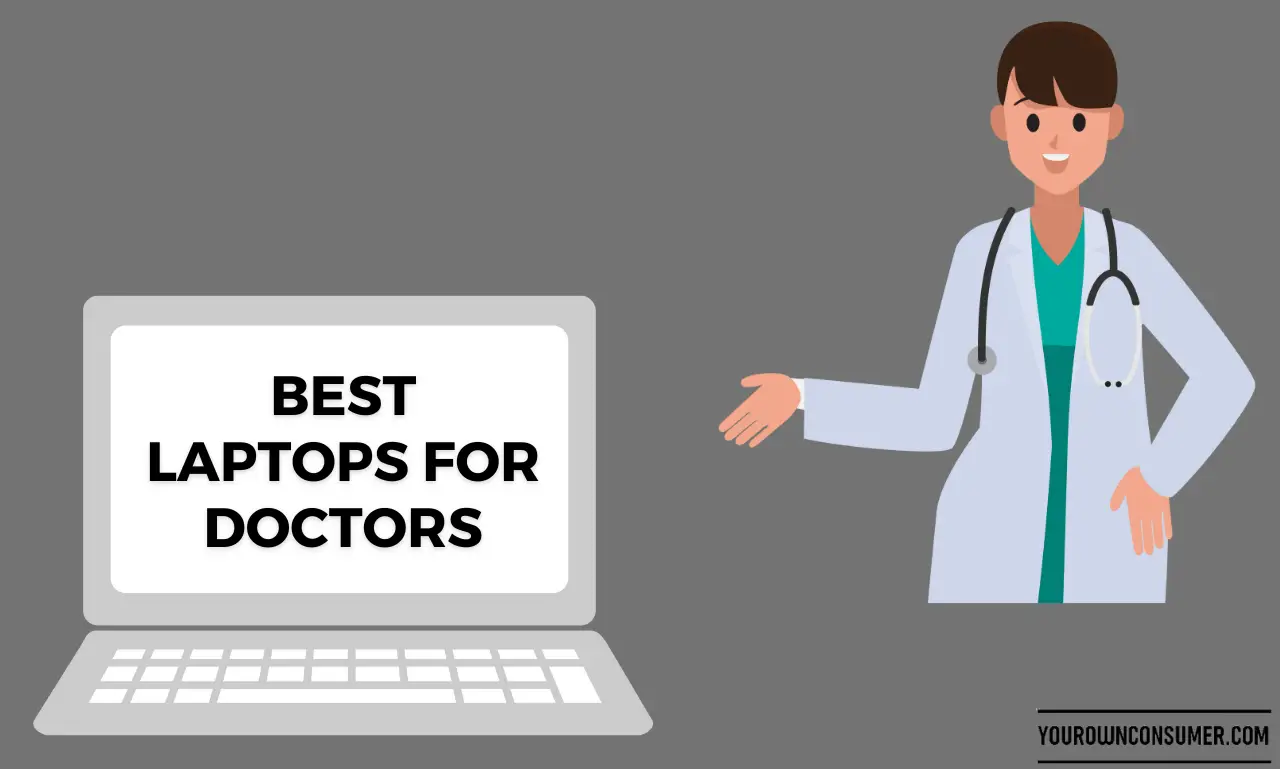In today’s world, technology is a must-have for doctors. From electronic health records to telemedicine, the right laptop is essential for providing the best care to patients. But with so many options on the market, it can be difficult to decide which ones are the best laptops for doctors.
That’s why we’re here to help – we’ve rounded up the six best laptops for doctors with powerful performance and reliable security features. So whether you’re looking for an all-in-one device or something more lightweight and portable, there’s sure to be an option that fits your budget and requirements. Read on to find out which laptops made our list of the best ones for doctors! Yes, there are many other options out there, but we wanted to ensure you are not overwhelmed, so we handpicked the ones we know every doctor will find useful.
Best Laptops for Doctors- Rated by Our Experts
Laptop | Reasons to Buy | Our Rating | Buy Link |
Dell XPS 15" 9530  |
| ||
Lenovo ThinkPad X1 Carbon Gen 10  |
| ||
HP Spectre x360-14  |
| ||
Microsoft Surface Pro 9  |
| ||
HP ZBook Studio 16  |
| ||
MacBook Pro 14 M2 Pro  |
|
What To Look For In Laptops For Medical Professionals
When shopping for laptops for medical professionals, it’s important to consider the features and specs that best suit their needs. Doctors need machines that are durable, reliable, and secure. This means looking for a laptop with a strong processor, good battery life, plenty of storage space, and robust security features. Finding one that offers versatility regarding ports and connectivity options is also important.
Another consideration is the size of the laptop. Portability is key for doctors who need to take their machines on the go with them. Look for a lightweight laptop with a slim profile that easily fits into a bag or briefcase. On the other hand, if you’re looking for something more powerful with more screen real estate, you’ll want to opt for a larger model with additional RAM and storage capacity.
Finally, you should also factor in your budget when selecting a laptop. Consider what features are most important to you and look for models within your price range that offer those features. Doing so can help ensure you get the best value possible from your purchase.
Processor Requirements
Medical professionals need reliable performance regarding the processor to handle tasks like running analytics and image processing. Ideally, a laptop should have a multicore processor with a clock speed of at least 2.5GHz or higher for optimal performance. It’s also important to look for a processor with hyper-threading technology, which allows two threads of instructions to be processed simultaneously, improving the overall efficiency and speed of the laptop.
The type of processor is also important when choosing laptops for medical professionals. Intel i7 processors are typically recommended for most applications as they offer superior performance capabilities compared to other models on the market. For those needing more intensive performance requirements, such as 3D modeling or video editing, an Intel Core i9 processor may be necessary. These processors are designed specifically for heavy workloads and provide much more power than their predecessors.
No matter what type of processor is chosen, it’s essential that it can handle all necessary applications with ease and provide sufficient amounts of power for multitasking. A laptop with an adequate amount of RAM is also essential to ensure that multiple tasks can run concurrently without lagging or crashing. Choosing a laptop with a good processor is key in ensuring that all medical tasks are handled quickly and efficiently.
Ram Considerations
When it comes to purchasing a laptop for a doctor, RAM should be taken into consideration. RAM stands for random access memory and is an important component for laptop performance. It enables the computer to access data stored in its memory quickly. The more RAM your laptop has, the more programs you can run simultaneously without causing lagging or slowing down of the system.
For a doctor’s laptop, 8GB of RAM is usually sufficient to operate multiple applications without any issues. However, 16GB of RAM is optimal for those needing laptops to run more intensive applications such as video editing or 3D modeling software.
If you anticipate needing more than 8GB of RAM, make sure the laptop you choose can accommodate that amount of memory. Ideally, the laptop should have a free slot (or two) to install additional memory if needed. Be aware that some laptops may not support larger amounts of memory, so check with the manufacturer before making your purchase decision. Additionally, research whether there are any limitations on how much memory can be upgraded on certain systems. Having adequate amounts of RAM will help ensure your doctor’s laptop performs optimally and efficiently throughout its lifetime.
Storage Solutions
Moving on from RAM considerations, storage solutions are a key factor when shopping for doctors’ laptops. It’s important to find a laptop with enough storage capacity to meet the needs of your profession. Whether you need space for large files, patient records, or other data-heavy applications, ensuring your laptop has enough storage is essential.
The most popular types of storage are solid-state drives (SSDs) and hard disk drives (HDDs). SSDs are generally faster and more reliable than your traditional HDDs but tend to be more expensive. However, they offer better performance regarding boot speeds and faster read/write times. HDDs are cheaper but can be slower and less reliable than SSDs. Depending on your needs, either type of drive could work for you.
Ultimately, deciding how much storage you need depends on what kind of applications you’re using and how much data you plan to store on your laptop. If you plan to use high-end programs such as CAD or video editing software, an SSD is ideal because these programs require fast read/write speeds. On the other hand, an HDD might be sufficient if you want basic computing capabilities and don’t plan to store large files or lots of pictures or videos. Ultimately, it’s up to you to decide which type of storage best suits your needs.
Graphics And Display Quality
Graphics and display quality are crucial when finding the best laptops for doctors. Doctors need to be able to view medical images with precision and accuracy, so it’s important to have a laptop with a high-resolution display. Look for at least 1080p resolution to ensure you get the best visuals. Additionally, if you’re dealing with 3D imaging or other more complex visuals, look for a laptop with built-in graphics capabilities. This will make sure your laptop can handle the complexity of such tasks.
Furthermore, IPS (In-Plane Switching) panels are usually the way to go when it comes to color accuracy and vibrancy. They offer better viewing angles than TN (Twisted Nematic) panels while providing excellent color accuracy. Also, consider HDR (High Dynamic Range) if you’re looking for even more vivid colors and deeper blacks. But keep in mind that these features come at an extra cost.
Overall, depending on your needs and budget, many laptops offer great graphics and display quality for doctors. Just do some research before purchasing so you’ll end up with something suitable for your needs. Although the biggest displays in the market are over 17 inches, the laptops are quite big and not ideal to carry around, so we have suggested the best laptops for doctors that are 16 inches or less.
Battery Life
Moving on from graphics and display quality, battery life is important when purchasing a laptop for medical professionals. Doctors need to be able to use their laptops in the field, which means it needs to have enough power to last throughout the day. Many laptops have impressive battery life, ranging from 8-12 hours, depending on the model and usage. This makes them ideal for those needing laptops to last through long hospital shifts or rounds.
When looking at battery life ratings, note any caveats that come with them. Some manufacturers may rate their laptops based on light usage or certain settings enabled. It’s also important to note that features like wireless networking can drain your battery faster than normal. Knowing how you plan to use your laptop can help you make an informed decision about which model will best suit your needs.
To ensure you get the most out of your laptop’s battery life, it’s important to regularly shut down unused applications and disable unnecessary features like Bluetooth or Wi-Fi when not in use. Additionally, you should always keep your system up-to-date with the latest software updates as these often include energy efficiency and performance improvements. Taking these simple steps will help keep your laptop running smoothly for longer periods of time.
Operating System Options
When selecting the best laptop for a doctor, the operating system is one of the primary considerations. While Mac and Windows are the two most popular choices, they both have their own pros and cons.
Macs are known for being reliable, secure, and easy to use. However, they have limited customization options and a higher price tag. Additionally, Macs do not support certain medical software programs or hardware components that may be necessary for a doctor’s specific use case.
Windows laptops offer more flexibility than Mac computers regarding usage and customizability. They also tend to be less expensive than Macs, but may require more maintenance to stay secure from viruses and other malicious software. Furthermore, Windows machines can run almost any type of medical software or hardware components that a doctor might need for their practice.
When choosing an operating system for a laptop intended for medical use, it is important to consider both the cost of the laptop itself and the long-term maintenance costs associated with each operating system option. The right decision will depend on the individual doctor’s needs and preferences.
Security Features
Regarding laptops for doctors, security should be a top priority. For this reason, many laptops come with advanced security features that help protect sensitive data and keep your information safe. It’s important to look for a laptop with an antivirus program, encryption software, and other security measures built in.
Many laptops also come with biometric authentication technology, which allows only authorized users to access the system. This can be especially useful for doctors who store confidential patient information on their laptops. Fingerprint scanners, facial recognition software, and even voice-recognition systems are just a few options available.
Another important feature to consider when choosing a laptop for a doctor is disk encryption. This helps protect data stored on the device from unauthorized access or modification. It’s also important to look for laptops with password protection and two-factor authentication as another layer of protection against hackers and cybercriminals.
When shopping for laptops for doctors, it’s essential to ensure the device meets all necessary security requirements so your data remains secure.
Portability Factors
Regarding portability, doctors need a laptop that can easily move from one place to another. Doctors who travel frequently will want a laptop that is lightweight and compact. On the other hand, those who don’t need to travel much may opt for a laptop with more powerful features but heavier in weight.
The most important factor for portable laptops is battery life. A doctor should have a laptop with at least 8 hours of battery life so they can work uninterrupted. The display size should also be taken into consideration. Look for laptops with 13-15 inch displays that offer plenty of screen space while being reasonably light and portable. An HD resolution will ensure crisp visuals on the small display.
When selecting a laptop, doctors should also look at connectivity options like USB-C ports which support fast data transfer speeds and charging, and Wi-Fi 6, which offers faster download speeds and improved range compared to older standards. Finally, consider getting an extended warranty to cover any potential damages or repairs caused by accidental drops or spills while traveling.
Top Models On The Market
With the array of options available in the market, it might get overwhelming to decide which one to pick. Below are our top picks for the best in every segment to help you make an informed decision.
There were tons more options, but we limited it to the specific models to not overwhelm you with the choices but give you a to-the-point breakdown of the best laptops for doctors and why.
Dell XPS 15 – 2023 Model- Latest Specs and Slim (Our Pick for Best Overall Windows)
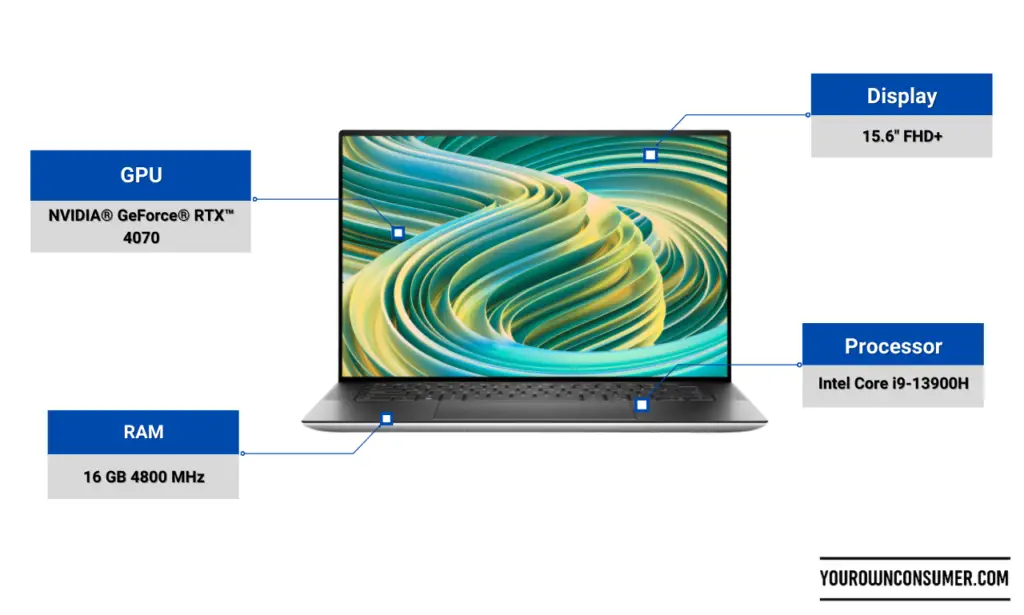
| Component | Specification |
| Processor | 13th Generation Intel® Core™ i9-13900H Processor 14-Core, 24MB Cache, up to 5.4 GHz |
| Graphics Card | NVIDIA® GeForce® RTX™ 4070 with 8 GB GDDR6 |
| Display | 15.6″ FHD+ (1920 x 1200) InfinityEdge Non-Touch Anti-Glare, 500-Nit Display |
| Memory | 16 GB, 2 x 8 GB, DDR5, 4800 MHz, dual-channel |
| Hard Drive | 512GB M.2 PCIe NVMe Solid State Drive |
| Support | 1 Year Premium Support |
| Keyboard | Backlit Black English Keyboard w/ Fingerprint Reader |
| Ports | 1 USB 3.2 Gen 2 Type-C™ port with DisplayPort™ |
| 2 Thunderbolt™ 4 (USB Type-C™ 3.2 Gen 2) ports | |
| 1 headset (headphone and microphone combo) port | |
| (1) USB-C to USB-A v3.0 & HDMI v2.0 adapter (included) | |
| Slots | 1 SD-card slot, 1 Wedge-shaped lock slot |
| Camera | 720p at 30 fps, HD camera |
| Dual-array microphones | |
| Audio and Speakers | Stereo woofer 2.5 W x 2 and stereo tweeter, 1.5 W x 2= 8 W total peak |
| Wireless | Intel® Killer™ Wi-Fi 6 1675 (AX211) 2×2 + Bluetooth 5.2 |
| Primary Battery | 6-Cell Battery, 86WHr (Integrated) |
| Power | 130Watt Type-C Adapter |
The Dell XPS 15 is an excellent choice for those who need something highly powerful and reliable with the 13th Generation Intel Core i9 processor. It has a great battery life and can handle multiple tasks with ease. The laptop has 16GB of RAM, and 512GB of storage. You also have the option to choose the 32 GB and 64 GB RAM variants along with 1TB/ 2TB/ 4TB or the mammoth 8 TB storage options if you need a lot more space for storage.
Additionally, The Eyesafe display technology integrated into the device reduces harmful blue light without compromising color vibrancy. Upgrade to an OLED display with true black backgrounds and vivid colors. The device’s 4-sided InfinityEdge display offers a large 16:10 screen and an impressive 92.9% screen-to-body ratio, providing a visually stunning experience. This makes it perfect for intensive workloads such as medical software and heavy research applications.
Lenovo ThinkPad X1 Carbon Gen 10 – Most Secure (Our Pick for Best Value for Money)
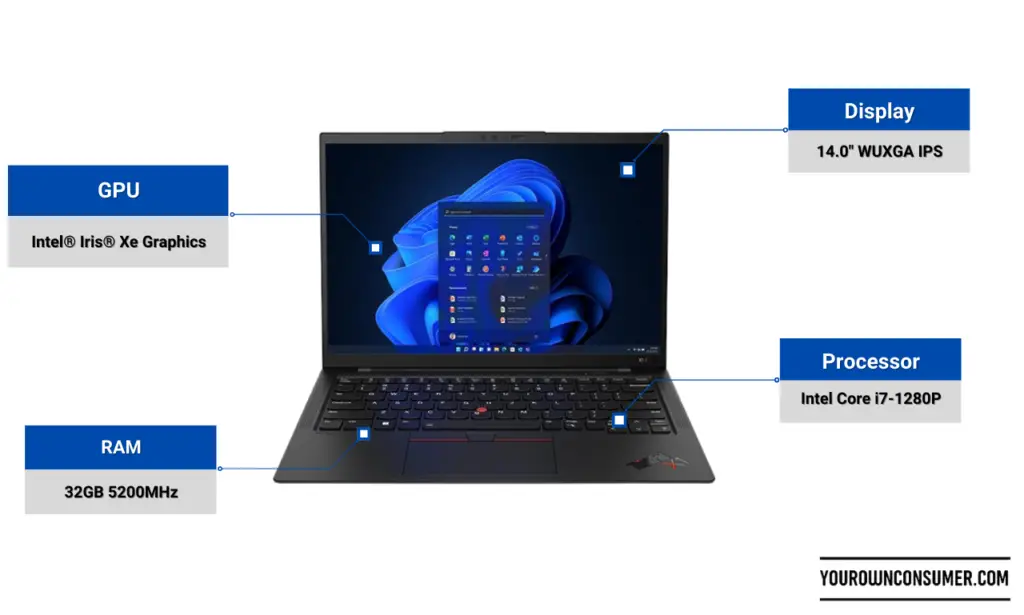
| Component | Specification |
| Processor | 12th Generation Intel® Core™ i7-1280P Processor with vPro® (E-Core Max 3.60 GHz, P-Core Max 4.80 GHz with Turbo Boost, 14 Cores, 20 Threads, 24 MB Cache) |
| Operating System | Windows 11 Pro |
| Display | 14.0″ WUXGA (1920 x 1200) IPS, anti-glare, touchscreen with PrivacyGuard, 500 nits, 100% sRGB, screen-to-body ratio = 86.23%, aspect ratio = 16:10 |
| Memory | Up to 32GB LPDDR5 5200MHz (soldered dual channel) |
| Battery | 57Whr, Rapid Charge: (requires 65W PSU or higher) |
| Storage | Up to 2TB PCIe SSD Gen 4 Performance |
| Graphics | Integrated Intel® Iris® Xe Graphics |
| Security | Discrete Trusted Platform Module (dTPM) 2.0, Smart Power On fingerprint reader integrated with the power button (match-on-chip), Webcam privacy shutter, Kensington lock slot, Secured-core |
| Audio | Dolby Atmos® Speaker System (user facing, 4 x speakers), 4 x 360-degree far-field microphones, Dolby Voice® certified for professional conferencing solution |
| Camera | FHD RGB with webcam privacy shutter, FHD infrared (IR) Hybrid with webcam privacy shutter |
| Connectivity | WLAN: WiFi 6E** AX211 802.11AX (2 x 2), Bluetooth® 5.1 or above, vPro®: On vPro® processors |
| Ports / Slots | USB-C Thunderbolt™ 4 / Power in, USB-C Thunderbolt™ 4, USB-A 3.2 Gen 1, HDMI 2.0b, Lenovo Integrated Pen, Headphone/mic combo, USB-A 3.2 Gen 1, Kensington lock slot |
| Keyboard | Spill-resistant, Glass TrackPad 110mm / 4.33″, Backlit with white LED lighting, Air intake keys |
| Optional | Nano SIM slot |
The Lenovo ThinkPad X1 Carbon is another great option for doctors who want something lightweight and durable. It features a 14-inch display that offers plenty of screen real estate along with a bright backlit keyboard. The laptop’s Intel Core i7 processor, 8GB of RAM, and storage options up to 2TB SSD provide plenty of speed and storage so you won’t have to worry about running out of space quickly.
The ThinkPad X1 Carbon Gen 10 offers easy device location in case of misplacement or theft. The laptop is now compatible with Tile®, allowing users to locate their device through their smartphone even when the X1 is powered off. To utilize this feature, users need to subscribe to the Tile® service and activate it after downloading and setting up the service.
For enhanced security, the ThinkPad X1 Carbon Gen 10 includes biometric features such as the fingerprint reader integrated with the power button for instant login and boot-up. Additionally, the IR camera works with facial recognition software. The laptop also includes Computer Vision-based presence detection that automatically locks the device when the user moves away. Users can opt for the PrivacyGuard display to prevent anyone from seeing what is on the screen.
HP Spectre x360 14- Powerful 2-in-1 (Personal Favorite 2-in-1 Laptop)
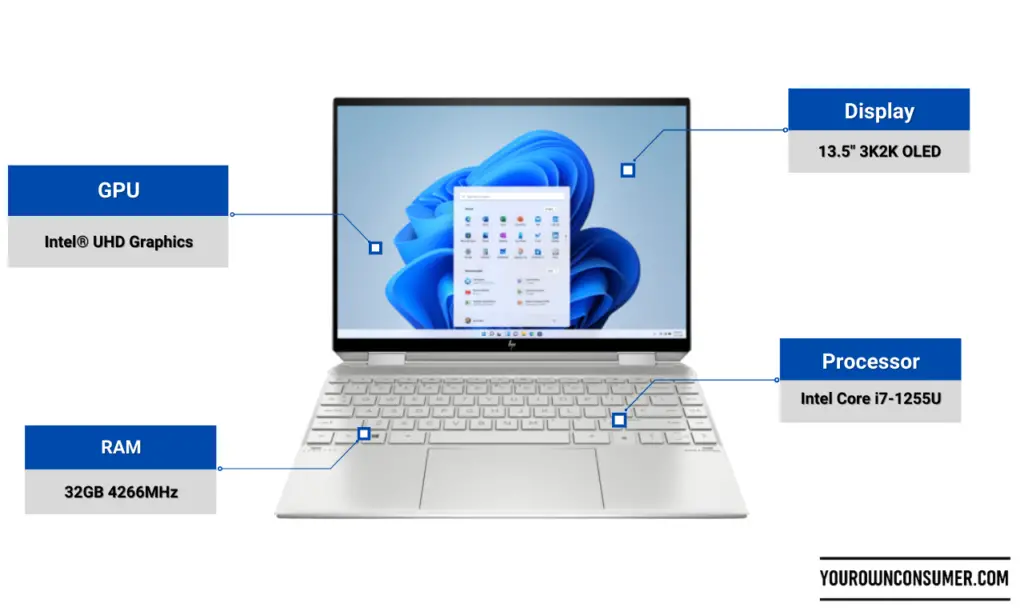
| Component | Specification |
| Processor | Intel® Core™ i7-1255U (up to 4.7 GHz with Intel® Turbo Boost Technology, 12 MB L3 cache, 10 cores, 12 threads) |
| Graphics | Integrated: Intel® UHD Graphics |
| Display | 13.5″ diagonal, 3K2K (3000 x 2000), OLED, multitouch-enabled, UWVA, edge-to-edge glass, micro-edge, anti-reflection Corning® Gorilla® Glass NBT™, Low Blue Light, SDR 400 nits, HDR 500 nits, 100% DCI-P3 |
| Finger Print Reader | Fingerprint reader |
| Memory | 16 GB LPDDR4x-4266 MHz RAM (onboard) |
| Storage | 512 GB PCIe® NVMe™ TLC M.2 SSD |
| Wireless Technology | Intel® Wi-Fi 6E AX211 (2×2) and Bluetooth® 5.3 wireless card (supporting gigabit data rate) |
| Power Supply | 65 W USB Type-C® power adapter |
| Battery | 4-cell, 66 Wh Li-ion polymer |
| Battery Life | Up to 11 hours and 45 minutes |
| External I/O Ports | 2 Thunderbolt™ 4 with USB Type-C® 40Gbps signaling rate (USB Power Delivery, DisplayPort™ 1.4, HP Sleep and Charge); 1 USB Type-A 10Gbps signaling rate (HP Sleep and Charge); 1 headphone/microphone combo |
| Webcam | HP True Vision 5MP IR camera with the camera shutter, temporal noise reduction, and integrated dual array digital microphones |
| Sensors | Accelerometer; eCompass; Color temperature light sensor; Gyroscope; IR Thermal sensor |
| Pointing Device | HP Imagepad with multi-touch gesture support; Precision Touchpad support |
| Keyboard | Full-size, backlit, nocturne blue keyboard |
| Stylus | HP Rechargeable MPP2.0 Tilt Pen |
The Spectre x360 14 is hands down the most stunning consumer laptop I’ve ever laid eyes on. Its bold, sleek design with sharp edges and polished accents make it a standout among 2-in-1 laptops. But it’s not just about looks. This laptop also boasts impressive features such as a 3:2 screen, bundled stylus, exceptional performance, and long battery life. The Spectre x360 14 is easily one of my new favorites in the convertible laptop segment, surpassing its competition in almost every area. It’s the perfect package of style, premium components, and functionality, proving that you really can have it all – for a price.
Microsoft Surface Pro 9/ Surface Pro 9 5G – Great 2-in-1 Laptop (Our Pick for Versatility)
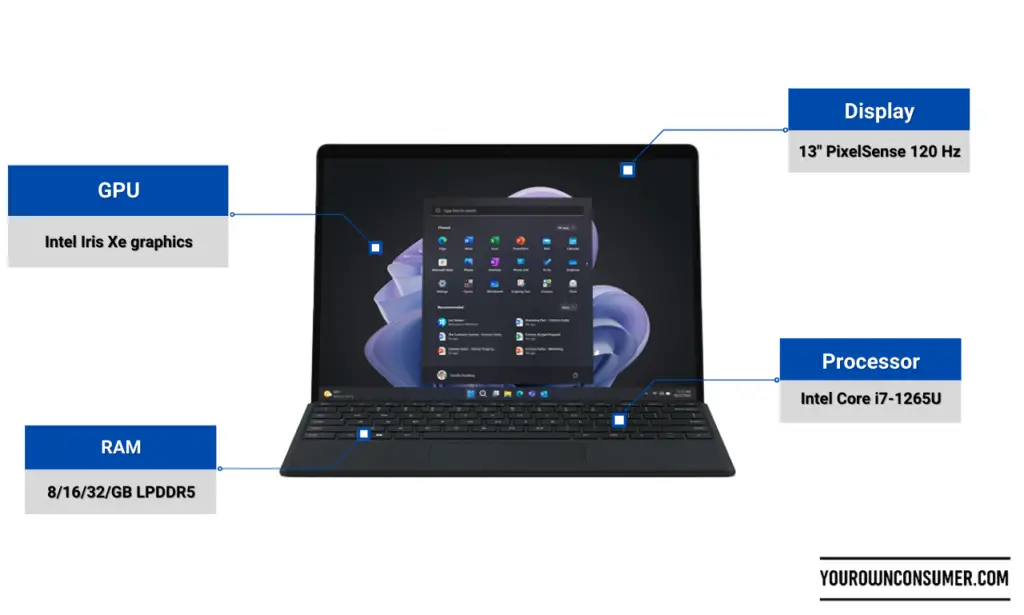
| Component | Specification |
| Processor | 12th Gen Intel Core i7-1265U processor |
| Graphics | Intel Iris® Xe graphics |
| Memory | 8 GB, 16 GB, 32 GB (LPDDR5 RAM) |
| Storage | Removable drive (SSD) options: 128 GB, 256 GB, 512 GB, 1 TB |
| Display | Screen: 13″ PixelSense™ Flow Displa; Resolution: 2880 × 1920 (267 PPI); Vivid Dynamic refresh rate up to 120 Hz |
| Battery Life6 | Up to 15.5 hours of typical device usage |
| Security | TPM 2.0 chip for enterprise-grade security and BitLocker support enterprise-grade protection with Windows Hello face sign-in Windows 11 Secured-core PC |
Surface 2-in-1s offer the convenience of both a laptop and tablet in a portable package, allowing you to stay connected while on the go. They are based on key principles such as timeless design, versatility, high performance, and seamless integration with Windows and Microsoft 365. With a Surface device, you can enjoy a tablet’s flexibility and a laptop’s power.
The Surface Pro 9 is our most advanced Pro device yet, with a range of silicon and connectivity options to cater to the needs of professionals. Whether you require maximum performance for demanding tasks while at your desk or need 5G connectivity for remote work, a Surface Pro 9 suits you.
Powered by 12th Gen Intel® Core™ processors on the Intel® Evo™ platform and Thunderbolt™ 4 ports, the Surface Pro 9 delivers superior performance and productivity tools to handle everything from CAD files to Excel spreadsheets. This device is perfect for finance professionals, sales representatives, mobile engineers, and case workers.
For those who need to work on the go and require the added benefits of an AI-powered Neural Processing Unit (NPU), the latest generation Microsoft SQ®3 powered by Qualcomm Snapdragon is the ideal choice. With instant access to 5G and advanced multitasking capabilities, this device is perfect for real estate agents, mobile engineers or technicians, and work site managers.
HP ZBook Studio 16 Wolf Pro Security Edition – Secured and Powerful (Our pick for Most Power and Security)
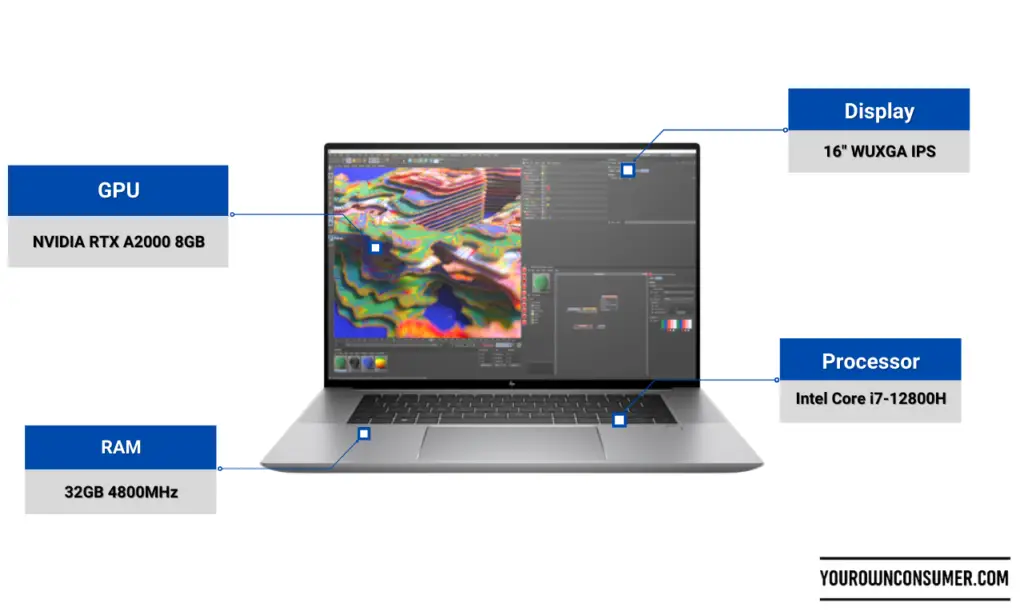
| Component | Specification |
| Processor | Intel® Core™ i7-12800H (up to 4.8 GHz with Intel® Turbo Boost Technology, 24 MB L3 cache, 14 cores, 20 threads) |
| Memory | 16 GB DDR5-4800 MHz RAM (2 x 8 GB) |
| Internal drive | 1 TB PCIe® NVMe™ TLC SSD |
| Memory card device | 1 microSD 7.1 media card reader |
| Display | 16″ diagonal, WUXGA (1920 x 1200), IPS, narrow bezel, anti-glare, 400 nits, 100% sRGB |
| Graphics | Integrated: Intel® Iris® Xᵉ Graphics Discrete: NVIDIA RTX™ A2000 Laptop GPU (8 GB GDDR6 dedicated) |
| External I/O Ports | Left side:1 power connector; 1 headphone/microphone combo; 2 Thunderbolt™ 4 with USB4™ Type-C® 40Gbps signalling rate (USB Power Delivery, DisplayPort™ 1.4, HP Sleep and Charge) Right side:1 Super Speed USB Type-A 5Gbps signalling rate (charging); 1 SuperSpeed USB Type-C® 10Gbps signalling rate (USB Power Delivery, DisplayPort™ 1.4) |
| Webcam | HP HD IR Camera 720p with face authentication and Windows Hello |
| Keyboard | HP Premium Quiet Keyboard – spill-resistant, full-size, backlit keyboard with programmable key |
| Wireless technology | Intel® Wi-Fi 6E AX211 (2×2) and Bluetooth® 5.3 wireless card (supporting gigabit data rate) |
| Fingerprint reader | Fingerprint Sensor |
| Power supply | 150 W Slim Smart external AC power adapter[48] |
| Battery | HP Long Life 6-cell, 86 Wh polymer |
HP’s ZBook Studio offers a sleek, high-quality alternative to other mobile workstations like the Dell Precision 5560 or the Lenovo ThinkPad P1. Unlike the bulkier ZBook Fury series, the focus is on mobility without sacrificing power.
The latest ZBook Studio 16 G9 boasts significant upgrades, featuring a larger 16-inch panel in a 16:10 aspect ratio with a brand-new case design. Graphics card configurations are varied, with options to suit any professional’s needs. The device we tested, is well-equipped with an Intel Core i7-12800H processor, 16 GB of RAM, and a 1 TB PCIe 4.0 SSD. The new display panel with 120 Hz and professional-grade Nvidia RTX A2000 graphics card make it ideal for demanding graphics processing.
MacBook Pro 14 M2 Pro 2023 Model – Best Value Mac (Best Display and Powerful)
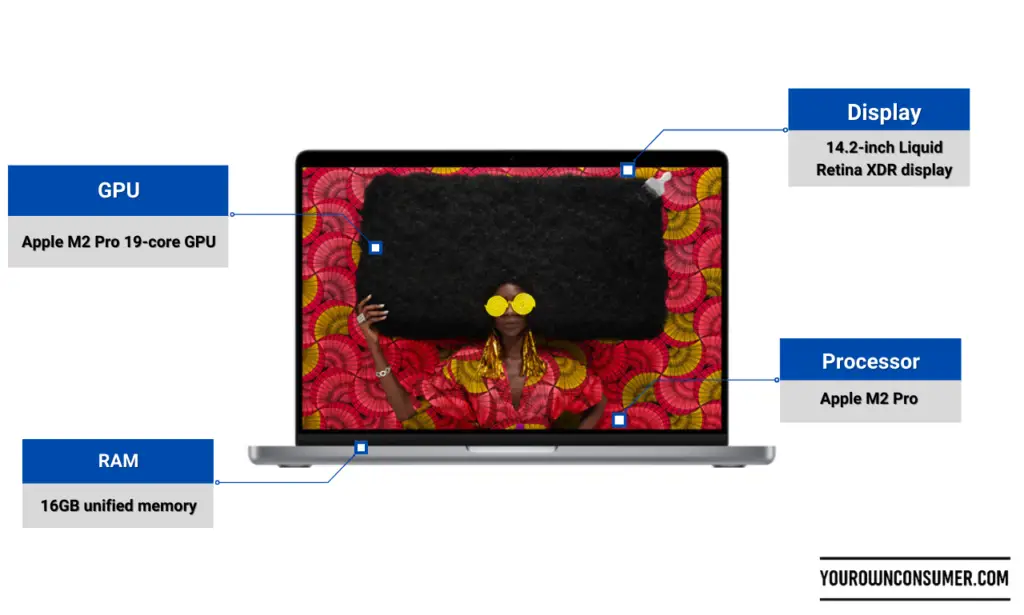
| Component | Specifications |
| Processor | Apple M2 Pro chip; 12-core CPU with 8 performance cores and 4 efficiency cores, 19-core GPU, 16-core Neural Engine, 200GB/s memory bandwidth |
| Display | 14.2-inch (diagonal) Liquid Retina XDR display; |
| RAM | 16GB unified memory (Configurable up to: 32GB) |
| Battery | 70-watt-hour lithium-polymer battery3, Fast-charge capable with 96W USB‑C Power Adapter |
| Storage | 1TB SSD (Configurable to: 2TB, 4TB, or 8TB) |
| Ports | HDMI port, 3.5 mm headphone jack, MagSafe 3 port, Three Thunderbolt 4 (USB-C) ports with support for: Charging, DisplayPort, Thunderbolt 4 (up to 40Gb/s), USB 4 (up to 40Gb/s) |
| Keyboard and Trackpad | Backlit Magic Keyboard, Touch ID, Ambient light sensor, Force Touch trackpad for precise cursor control and pressure-sensing capabilities; enables Force clicks, accelerators, pressure-sensitive drawing, and Multi-Touch gestures |
| Connectivity | Wi-Fi 6E (802.11ax)5, Bluetooth 5.3 |
| Camera | 1080p FaceTime HD camera, Advanced image signal processor with computational video |
| Audio | High-fidelity six-speaker sound system with force-canceling woofers, and Wide stereo sound |
This MacBook is the best value Mac you can get for the dollars spent. Yes, we can get the M2 Max but the M2 Pro chip is more than sufficient for most doctors. This has to be one of the best laptops for doctors from the Mac side.
The battery life of this MacBook is impressive, lasting for 24 hours and 12 minutes, making it an ideal choice for those who frequently travel for work or leisure. The laptop only requires charging once every few days when used for less demanding work.
In Cinebench R23, the MacBook Pro 14 M2 Pro scored 1641 in single-core and 11721 in multicore tests, beating the MacBook Pro 13 M2 and the Dell XPS 13 Plus. However, the Asus ROG Flow Z13, a gaming-centric Windows tablet with Intel’s Core i9-12900H, achieved comparable single-core and multicore scores. Windows laptops can outperform the MacBook Pro 14 but generally require higher-tier hardware that targets gaming and professional workloads.
The MacBook Pro 14 M2 Pro also excelled in our Blender benchmark test, completing the render in two minutes and 59 seconds, beating the Dell XPS 13 and MacBook Pro 13 M2. Even the older MacBook Pro 16 M1 Max required three minutes and 41 seconds to complete this test.
The MacBook Pro 14 M2 Pro’s display is excellent, and the speakers provide strong volume and clarity in any situation. The upward-firing speakers are well-tuned to handle music and movies, but the bass is lacking, and the maximum volume is average. Nonetheless, the MacBook Pro 14 is one of the best laptops for watching movies and TV shows
You can rarely get wrong choosing a MacBook Pro. It is powerful, the display is an industry leader, and the design is sleek.
Our Thoughts on Which are the Best Laptops for Doctors in 2023
After researching and analyzing various options, I’ve compiled a list of the best laptops for doctors. It’s important to note that each laptop has its strengths and weaknesses, so choosing one is crucial based on your specific use case.
The Lenovo ThinkPad X1 Carbon is an excellent choice for doctors needing a reliable and durable device. Its military-grade durability and long battery life make it perfect for doctors who need to take their laptops to patient rooms or on the go. Its security features, such as the fingerprint scanner and webcam cover, protect sensitive patient information.
For doctors who require a versatile laptop that can handle various tasks, the Dell XPS 13 2-in-1 is a great option. Its touch screen and 360-degree hinge can easily transform from a laptop to a tablet, making it perfect for taking notes, drawing diagrams, or viewing medical images. Its powerful performance and long battery life make it suitable for demanding tasks like video conferencing and data analysis.
Finally, for doctors who need a laptop with a compact but excellent display for viewing medical images and records, the Apple MacBook Pro 14 is an ideal choice. Its retina display offers exceptional color accuracy and clarity, and its powerful performance can handle demanding tasks such as video editing and virtual reality simulations. However, its price tag may not be suitable for all budgets.
In conclusion, the best laptop for doctors depends on individual needs and preferences. It’s essential to consider factors such as durability, versatility, performance, and display when selecting a laptop. Whether you’re looking for a reliable device for patient visits, a versatile machine for various tasks, or a laptop with a large display for viewing medical images, a laptop out there will meet your specific requirements. So, take the time to assess your needs and choose the laptop that best fits your use case.
Frequently Asked Questions
Q. What Type Of Software Is Best For Medical Professionals?
A: When it comes to medical professionals, having the right type of software is essential. Different types of software are designed to help medical professionals in their daily tasks and provide them with the information they need to understand their patients better. This article will explore the different types of software available for medical professionals and how they can be used to improve patient care.
The first type of software that medical professionals often use is Electronic Medical Records (EMR) software. EMRs are digital versions of patient records and allow doctors to access patient information quickly and easily. EMRs can also be used to store lab results, order tests, record notes, and track patient progress over time. This makes EMRs a great tool for medical professionals needing quick patient information access.
Another type of software commonly used by medical professionals is Clinical Decision Support Systems (CDSS). CDSSs are designed to assist healthcare providers in making decisions about diagnosis and treatment options for their patients. These systems use algorithms to analyze patient health history data and suggest treatment plans based on their individual needs. CDSSs can also provide recommendations for medications or other treatments that may be beneficial for a particular case.
Finally, telemedicine software has become increasingly popular in recent years due to its ability to bridge gaps between rural areas and urban centers where hospitals may not be available. Telemedicine allows physicians to connect with patients remotely through video conferencing or other remote communication tools. This allows doctors to diagnose and treat patients without having them physically present at the hospital or clinic. Telemedicine can also help reduce costs associated with travel expenses as well as eliminate wait times associated with traditional visits.
Software plays an important role in modern medicine, allowing medical professionals greater efficiency when dealing with patients’ needs while bridging gaps between rural areas where hospitals may not be available. Through Electronic Medical Records (EMR), Clinical Decision Support Systems (CDSS), and telemedicine tools, medical professionals have increased access to patient information, which helps them make informed decisions about diagnosis and treatment options more quickly than ever.
Q. Is It Possible To Upgrade The Ram On A Laptop For Medical Professionals?
When it comes to laptops, many medical professionals may find themselves asking if it is possible to upgrade the RAM. This can be beneficial for those looking to get the most out of their device. Upgrading the RAM allows medical professionals to access and process more information faster while providing a smoother experience overall.
Luckily, RAM upgrades are often possible on laptops, depending on the model. It’s important to check with your manufacturer before making any changes, as not all models allow them. For example, some models may require you to purchase specific parts or have an expert install you. Additionally, it’s important to know what type of RAM is compatible with your laptop before upgrading.
Once you’ve determined that your laptop can handle an upgrade, you must purchase the correct parts and install them properly. The installation process can vary from model to model but generally involves unscrewing the back panel and inserting new memory modules into their respective slots. Again, it’s important to refer to your laptop’s instructions before proceeding as incorrect installation could cause permanent damage. After completing the upgrade and powering up your device again, you should be able to take advantage of better performance right away.
Upgrading a laptop’s RAM can provide medical professionals with an improved user experience, allowing them to access more information quickly and efficiently. With careful research and proper installation, such an upgrade can help make working with technology much easier for medical professionals.
Q. Is It Worth Investing In A Laptop With A Higher Battery Life For Medical Use?
When considering a laptop for medical use, one of the main things to think about is battery life. Whether you’re in an office or working with patients, it’s essential to have a device that can last throughout the day without needing to be recharged. Investing in a laptop with a higher battery life could be worth it for medical professionals who rely on their devices for work.
With more powerful processors and better software than ever, modern laptops can handle complex tasks such as processing data or running graphic-intensive programs. However, this comes at the cost of battery life. If you need your laptop to last through long days, then investing in a model with superior battery performance may be wise.
When choosing a laptop for medical use, buyers should take into account both power and battery life. A device with good specs might be able to run smoothly but not last very long if it has poor battery performance. On the other hand, getting something with great battery life might mean sacrificing some speed or graphics quality which could be important depending on what tasks you need it to do. Consider all aspects carefully before making your purchase decision so that you can get the best possible balance between power and longevity.
Q. What Are The Advantages And Disadvantages Of Different Operating Systems For Medical Professionals?
When it comes to selecting the best laptop for medical professionals, one of the most important factors to consider is the operating system. Different operating systems have their own advantages and disadvantages, which must be weighed carefully in order to ensure that the right choice is made. In this article, we’ll discuss some pros and cons associated with different operating systems so that medical professionals can make informed decisions.
The most popular operating system on laptops today is Windows, which has a wide range of features and functions that make it ideal for medical use. It’s easy to use and offers access to many different applications and programs that are necessary for medical professionals. Additionally, Windows has excellent security features, which are important when dealing with sensitive patient information. On the downside, Windows can be prone to viruses and other malware, so it’s important to keep security patches up-to-date in order to protect against potential threats.
Another popular option for medical professionals is Apple’s macOS system. This operating system has a clean user interface and powerful tools for working with multimedia files or running specialized software. It also offers strong security features that are designed specifically for Macs. However, macOS can be quite expensive compared to Windows, so it may not be suitable if you’re on a budget. Additionally, compatibility issues may arise when trying to run certain programs or applications on a Mac computer.
Finally, Linux-based operating systems are another option for medical professionals needing a lightweight laptop with powerful performance capabilities. Linux provides an open-source platform that allows users to customize their laptops as they see fit while still providing access to many necessary applications and programs needed by doctors. The downside is that Linux requires more technical knowledge than other operating systems to get everything up and running correctly.
Choosing the right laptop for medical use requires careful consideration of all available options – including the type of operating system used – in order to ensure maximum performance and ease of use while still providing adequate security protections against potential threats. With this information in hand, medical professionals can make an informed decision about which type of laptop will best suit their needs.
Q. How Important Is Security For Medical Professionals When Choosing A Laptop?
When it comes to choosing a laptop, security is an important consideration for medical professionals. With the large amounts of sensitive patient data, they must handle, ensuring the safety and privacy of that information is paramount. This requires secure authentication methods and robust encryption protocols to protect against malicious actors and data breaches.
The operating system a medical professional chooses will have a big impact on the security of their laptop. Windows and MacOS both offer strong security measures, such as multi-factor authentication, integrated antivirus software, and patch management tools. However, Linux-based systems are even more secure due to their decentralized architecture and open-source codebase.
No matter which operating system is chosen, medical professionals should always select a laptop with the most up-to-date hardware components available in order to ensure maximum protection from malware and hacking attempts. Additionally, they should also look into third-party security solutions that can provide an added layer of defense against cyber threats. By doing so, they can help ensure the sensitive data in their care remains safe and secure at all times.
